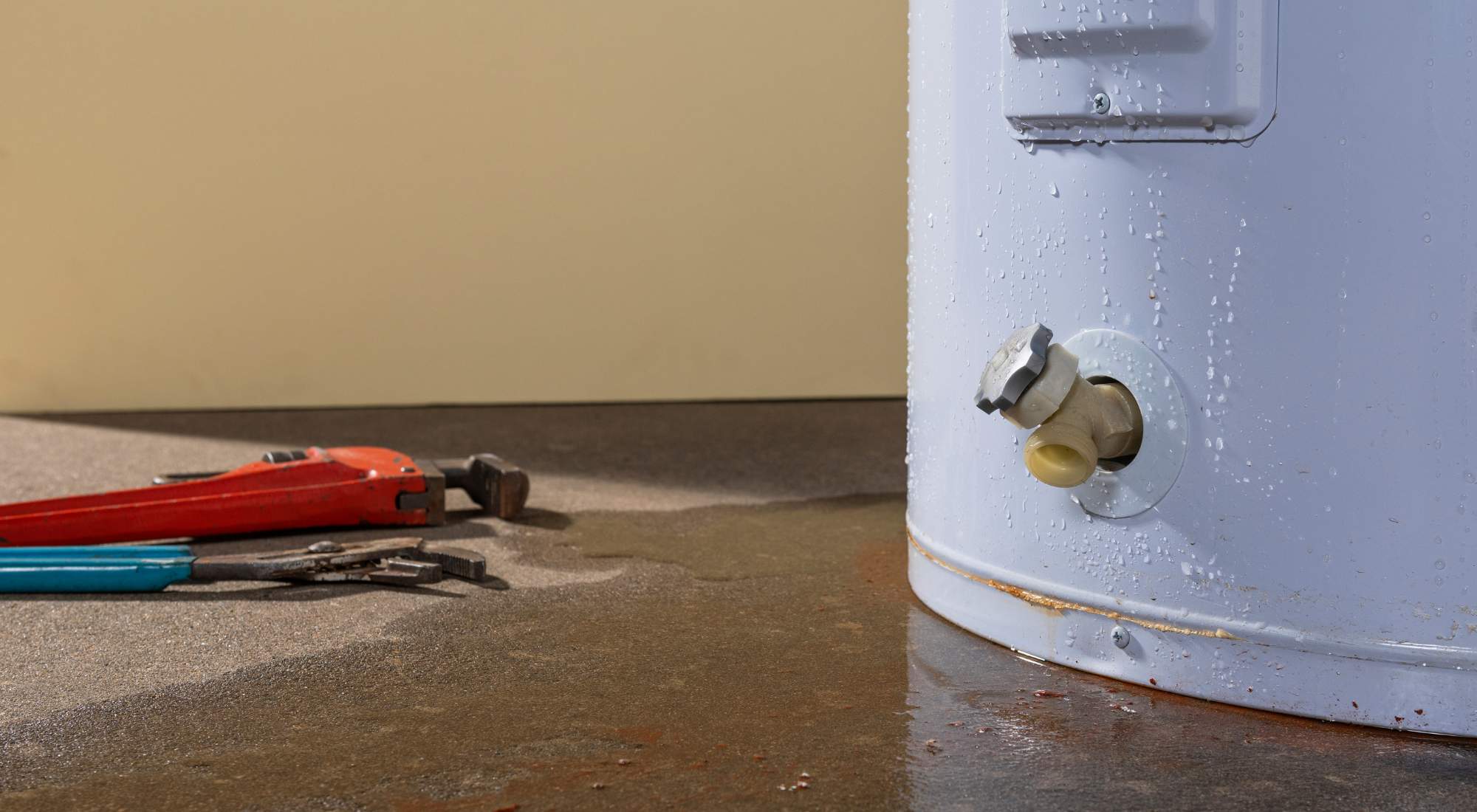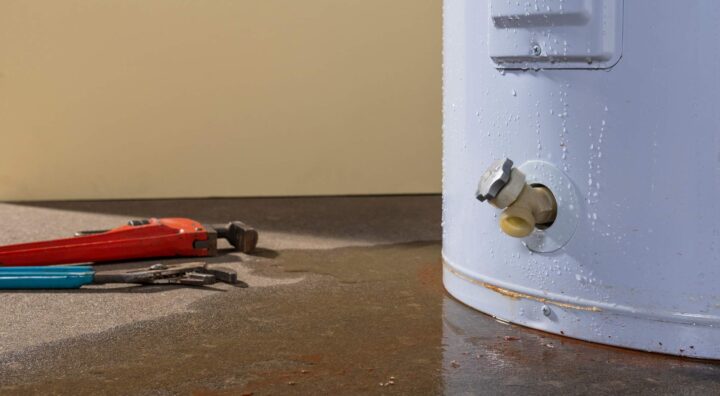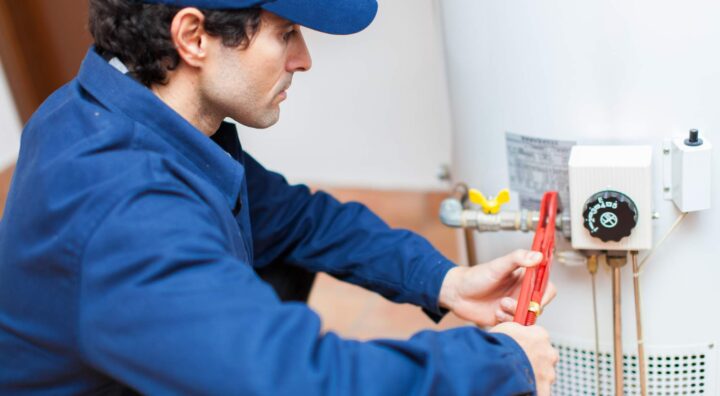
Daily tasks around your home are becoming inconvenient.
You aren’t enjoying your shower turning icy if you take too long washing your hair. You can’t wash your clothes in warm water and run your dishwasher simultaneously. Sometimes the water in your faucet nearly scalds your hands, while other times it is lukewarm.
Not to mention the strange noises that randomly come from your basement.
When your water heater starts to go out, life isn’t just inconvenient, but your home or health could be at risk.
Learn about the signs that your water heater is going out, tasks you can do to prolong the life of your water heater, and when it’s time to call in a professional.
Table of Contents
- How Long Should a Water Heater Last?
- What Are the Most Common Causes of Water Heater Failure?
- 8 Signs Your Hot Water Heater Is Going Out
- How Do I Know When My Water Heater Needs Replacing?
- Don’t Ignore the Signs That Your Water Heater Is Going Out
- When To Call the Pros for Your Water Heater
- AAA Heating and Cooling: Portland’s #1 Choice for Hot Water Heater Services
How Long Should a Water Heater Last?
Think of your water heater like a teenager. For the first decade, it mostly behaves. After that, it gets moodier, unpredictable, and might start making strange noises you don’t understand. Your water heater may not last as long as you think it will.
Tank-style water heaters last an average of 8-12 years. Tankless water heaters last an average of 15-20 years.
Several factors affect your water heater’s lifespan, including:
- Water quality: Hard water reduces the lifespan of water heaters.
- Proper installation: This ensures the longevity of the water heater.
- Usage: The more the water heater is used, the more strain is put on it.
- Regular maintenance: Flushing out the water tank and regular maintenance are essential.
Many water heaters can last well beyond the expected lifespan, so that isn’t the only reason to replace it, but it’s a good time to start keeping an eye out for issues and start saving money for when replacement is inevitable.
What Are the Most Common Causes of Water Heater Failure?
- Age and sediment build-up: If a water heater with a tank is well maintained, it can last over a decade. If left to its own devices, sediment from the water can build up at the bottom of the tank. Eventually, it will solidify at the bottom, causing decreased efficiency and eventual failure.
- Rust and corrosion: Water heaters contain an anode rod designed to prevent rust and corrosion. Once the rod has worn out, rust produces corrosion, causing leaks.
- Loose fittings: Loose connections allow water to leak, leading to corrosion. They can also cause inconsistent pressure, pressure valve leaks, and cracks in the tank.
High pressure: High water pressure causes unnecessary tension on all components of a water heater, reducing its lifespan and creating issues with the pressure release valve. Leaks can develop and potentially cause the tank to rupture.

8 Signs Your Hot Water Heater Is Going Out
#1: Short/No Supply of Hot Water
Unless you regularly participate in Polar Bear plunges, you may be frustrated when your shower turns frigid.
A sure sign that there is an issue with your water heater is a low supply of hot water.
When water heaters start to go bad, they aren’t able to heat water properly. Your showers may have to be cut short, and you may not have enough hot water to meet all of your household needs.
#2: Low Water Pressure
When your faucet has no issues blasting cold water, but there is only a trickle from the hot side, it is a signal that your water heater is going to need to be repaired or replaced.
Low water pressure can be caused by sediment buildup, which restricts the flow of hot water to your faucets and showerheads, or a faulty valve. If the valve is corroded or not able to fully open, water pressure may be low.
#3: Water Leaks
Puddles of water from a leaky water heater shouldn’t be a form of quirky decor. If your water heater is leaking, it is a definite indication that it needs to be repaired or replaced.
The older your water tank is, the more susceptible it is to leakage.
Water leaks can occur for many reasons, including:
- Rust and corrosion
- Loose or damaged connections
- A faulty temperature and pressure valve
- Excessively high water pressure
- A bad anode rod
- Improper ventilation
To prevent unwanted damage to your home and maintain your hot water supply, if you see evidence of leaks, it may be time to call in a professional.
AAA Heating and Cooling prides itself on quick turnaround time for servicing and repairs. Our licensed and bonded team has endless experience in repairing and servicing nearly every make and model of water heater.
#4: Strange Odors
When your water starts smelling funky, like rotten eggs, you may have an issue with your water heater that needs to be addressed.
The atrocious smell could be the result of bacteria building up in the warm, stagnant water. The bacteria feed on sulfates in the water and react to the anode rod, producing hydrogen sulfide gas, which is the source of the smell.
Sediment build-up at the bottom of the tank could also contribute to the smell.
#5: Growing Energy Bills
As your water heater begins to pass its prime, its efficiency decreases, causing you to have to spend more money on energy bills.
Increased energy bills may be a result of sediment building up at the bottom of the tank. As minerals accumulate, heat can’t diffuse properly, so it’s less efficient.
To combat this issue, drain the tank every six months to reduce the sediment and prolong the life of your water heater.
#6: Discolored Water
If the sink full of hot water you prepared for washing your dishes looks like you dumped tea into it, chances are high that your water heater is acting up.
Discolored water that is yellow or rusty means that the anode rod is about to give out.
The anode rod prevents corrosion, and when it doesn’t function properly, the tank itself may begin to rust, which may lead to a whole slew of problems.
#7: Inconsistent Water Temperature
If you know your kids didn’t flush the toilet in the middle of your shower, but the water is intermittently cold, the water heater might be failing.
There are several reasons your water temperature may fluctuate, including:
- A malfunctioning thermostat
- Sediment build-up is causing inconsistent heating
- A failing heating element
- An undersized tank
- Pressure imbalance
- Leaks or blockages
Your water heater may need to be flushed, may need a component repaired, or may need to be replaced.
Consult the professionals at AAA Heating and Cooling for top-of-the-line service, and get back to enjoying your long, hot showers in no time.
#8: Unusual Noises
If your water heater sounds like a rock band practicing in your basement, something is wrong.
Popping, banging, and rumbling sounds coming from a water heater are an indication that sediment has built up at the bottom of the tank. When this happens, the unit will eventually fail.
You might hear a rattle or bang from your water heater if there is a loose heating element.
Whistling or hissing sounds may be a result of high pressure on the pressure relief valve, causing damage and improper functioning, or it could be a sign of a leak.
How Do I Know When My Water Heater Needs Replacing?
Issues with your water heater may not always require replacement. However, if you find you are becoming besties with the repairman because you are having so many problems, replacing your water heater is imminent.
Preventive maintenance will extend the life of your water heater.
When your water heater does start to fail, each repair may end up being a catalyst for more problems to develop, or existing problems may worsen. This can be a costly cycle.
If you find yourself needing multiple repairs, it may be more budget-friendly in the long run to replace the water heater.

Don’t Ignore the Signs That Your Water Heater Is Going Out
Ignoring the tell-tale signs that your water heater is on the brink of exhaustion can be dangerous to your home and health.
Putting off repairing or replacing your water heater is unwise for many reasons, including:
- Water damage and mold: A leaky water heater may cause significant damage to your floors, the surrounding area, and your belongings, especially if it bursts. If leaks are let go long enough, structural damage can occur, and mold may begin to manifest, risking the integrity of your home and your health.
- Electrical hazards: Electrical outages and shortages may become more common as your water heater ages. A tripped breaker or blown fuse is frustrating, but the problem can be quite serious. If the electrical components are not functioning properly in your water heater, it may lead to shock and serious injuries.
- Overheating: When the heating element becomes overworked due to built-up sediment, it must stay on longer to heat the water to the right temperature. This, or a faulty thermostat, can cause the water temperature to be higher than it should be. Scalding water could flow out of your faucets, causing serious burns and putting your home at risk of fire.
- Small animals: Small animals are drawn to the warmth of water heaters to build their nests. Older water heaters are more at risk of having nesting animals inhabit them, and the risk of damage is high. Animals often chew on insulation and wires, preventing your water heater from functioning properly and turning it into a fire hazard.
When To Call The Pros For Help With Your Water Heater
There are tasks that homeowners can do to stay on top of maintaining their water heaters and to troubleshoot problems, such as:
- Checking to ensure a breaker isn’t tripped so that the water heater has power
- Making sure the unit is receiving water and that the water supply valve is open
- Lowering the thermostat to prevent scalding temperatures
- Flushing the tank to remove sediment
- Checking for leaks and corrosion regularly
Most average homeowners don’t possess the plumbing and electrical knowledge required to repair a water heater. It is best to call in the professionals for help when you begin observing signs of failure.
Professionals can:
- Perform preventative maintenance and identify potential issues before they happen
- Handle gas, electrical, and water components safely to reduce the risk of accidents
- Accurately diagnose the problem and provide fruitful solutions
- Meet warranty compliance

AAA Heating and Cooling: Portland’s #1 Choice for Hot Water Heater Services
When your water heater is on the brink of destruction or simply needs a repair, AAA Heating and Cooling provides high-quality services, repairs, and installations to meet all of your water heater needs.
Our expertly trained technicians put your health, safety, and comfort first. For over 60 years, we have been providing families like yours with superior customer service. We understand the urgency of water heater issues and will work to quickly provide a solution.
With transparent pricing and lifetime warranties, AAA Heating and Cooling provides services you can count on. Whether you need installation or repair of a tankless water heater, a traditional water heater, or a solar water heater, contact us today!
